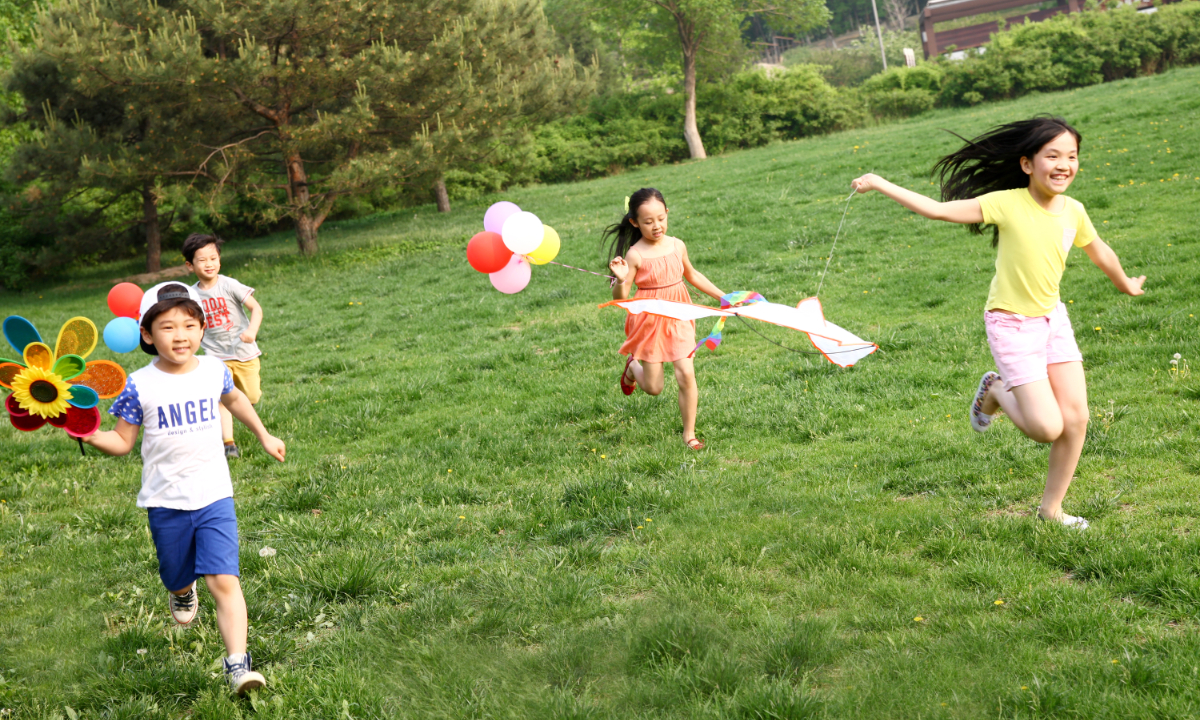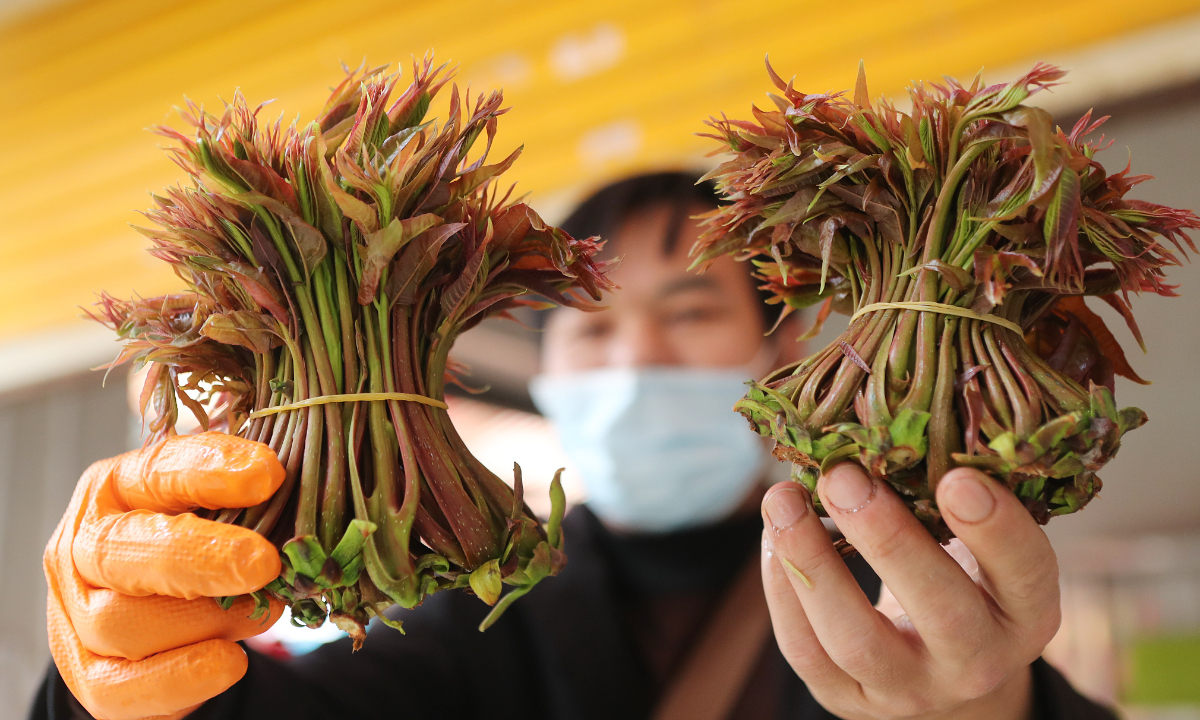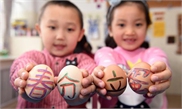ARTS / CULTURE & LEISURE
A day for balance
How do Chinese celebrate the 3,000-year-old Spring Equinox?

After the Spring Equinox, kite flying is a popular outdoor activity. Photo: VCG
Chunfen, or Spring Equinox - one of the traditional Chinese Solar Terms that help make up the Chinese calendar - begins on Tuesday. During this roughly two-week period, Chinese traditionally like to head out to fly kites or play a game in which they try to balance an egg to make it stand up. Although Spring Equinox may not be as popular as other Solar Terms such as Dongzhi (Winter Solstice) and Xiazhi (Summer Solstice), cities across the country have already started celebrating ahead of time.
Beginning on March 21 and ending on April 4, Spring Equinox, as the name indicates, begins when day and night are of equal length. During this period, the sun's position in the sky moves northwards, marking a gradually longer day in the Northern Hemisphere and a longer night in the Southern Hemisphere.
"Ancient Chinese meteorology has its own very distinctive regional characteristics considering our country's special closed and unique geographical environment. Therefore, we can see philosophical principles of traditional Chinese culture reflected in this ancient science," Wuhan-based Chinese folklorist Liu Yu told the Global Times on Wednesday.
"Take the Spring Equinox for example, the equal division of day and night also coincides with the philosophy of neutrality in Chinese culture, which represents impartiality: nothing too much or too little."
Setting aside the profound relationship between Chinese philosophy and the Solar Terms, there are many interesting customs that have been passed down in different places across China over the centuries to celebrate this unique day.
At first, it was used by ancient farmers to mark the beginning of the sowing season and farm work, at the same time welcoming the season of spring. As time passed, customs surrounding the equinox produced various activities such as dragon dances, waist drum performances and shadow puppetry.
Well preserved events
With the Spring Equinox right around the corner, crowds of people from around the country have been heading to Anren, a small county in Central China's Hunan Province, to take part in sacrificial ceremonies to memorialize China's "Divine Farmer" Shennong and pray for a good harvest, as well as trade commodities such as medicinal herbs, grain seeds and agricultural tools.
They are also joined by merchants and locals celebrating together. This weeks-long event is called Gan fen she (Spring Equinox market fair) by locals.
The earliest records of the event date to the Song Dynasty (420-479), as locals at the time believed that Shennong, a mythological ruler also known as the Yan Emperor, was a native of Anren in ancient times.
As agriculture was one of the most key traditional industries in ancient China, offering sacrifices to Shennong became an indispensable custom in Anren.
Held on the first day of Spring Equinox, the sacrificial ceremony is mainly divided into two parts.
First, villagers gather in the field to play suona, a traditional Chinese wind instrument, and perform dragon dances. Then the farmers, wearing woven coir raincoats, begin the symbolic first plowing of the season and pray for a good harvest in the coming year.
A villager surnamed Li told the Global Times that during the equinox, locals will gather together with herbs they have collected at the local medicinal trade post. "There are many varieties of medicinal materials at the trade fair, at least hundreds of varieties," Li said.
In addition to Anren, in other places including Chengdu in Southwest China's Sichuan Province and Fengxiang in Northwest China's Shaanxi, people will sweep tombs and pray to their ancestors until the Qingming Festival, also known as the Tomb Sweeping Festival, on April 5.

Eating spring cuisine is one of traditional customs of Spring Equinox. Photo:VCG
More than a period of time
Though there is no one single major event that prevails across the country, there are some celebrations that are seen in most places around China, some of which have even made their way overseas.
In Beijing, a celebration is also being held on Saturday at the China Millennium Monument so traditional handicraftsmen can introduce how to make kites to visitors.
Flying kites is a nationwide custom as the weather gets warmer, so visitors will crowd into parks to enjoy the outdoor activity.
Worth mentioning is a traditional egg-standing game that originated from the Spring Equinox celebration and has found its roots around world: To play, you simply grab a fresh egg and try to find a way to stand it up.
Rumors have it that an egg can be stood up on the day of the equinox because of the position of the sun in the sky, but in truth this has more to do with one's own skill and the type of egg you choose than anything else.
"The game is a lot less prevalent in China today mainly because it's not a traditional festival. But that doesn't mean it is less important than those festivals that are thousands of years old," said Liu.
The 24 Solar Terms were added to the UNESCO World Intangible Cultural Heritage List in 2016.
For experts, the Solar Terms are not just important because they reflect the advanced scientific knowledge of ancient Chinese, but more important is the role they played in promoting the social development of China.
"In the early days of Chinese civilization, the 24 Solar Terms successfully promoted farming and therefore allowed the population to multiply. Our Chinese ancestors strived to explore why the weather changed and tried to decode the patterns of nature using their knowledge," said Liu.

